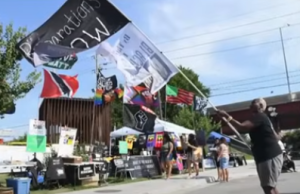A suburb of Chicago, Evanston, Illinois, is embroiled in a legal battle over its government-funded reparations program, which was designed to compensate Black residents for decades of systemic discrimination. Evanston became the first municipality in the United States to implement such a program, aiming to address historical injustices that targeted Black residents through racially discriminatory housing policies. The program, however, is now facing a class-action lawsuit filed by a conservative group, which claims the initiative discriminates against non-Black residents.

Grounds for the Lawsuit
The reparations program in Evanston targets Black residents who either lived in the city between 1919 and 1969 or are descendants of those who did. The city implemented this program in response to its own history of racial segregation and housing discrimination, which systematically prevented Black residents from accumulating wealth in the same way their white counterparts did. The reparations are intended to repair the economic harm caused during those decades. However, the lawsuit, filed by a conservative group, argues that this program is discriminatory because it excludes non-Black residents from receiving similar benefits. The plaintiffs contend that by limiting eligibility to Black residents, the city is violating principles of equality, as the program only serves one racial group.
This legal challenge is part of a larger wave of conservative opposition to race-based initiatives that have emerged across the country since the murder of George Floyd in 2020. Various programs aimed at addressing racial inequalities have come under scrutiny, particularly those that are seen to benefit certain ethnic groups at the perceived expense of others. Recently, the U.S. Supreme Court has also ruled against affirmative action policies in education, further reflecting a judicial climate that is increasingly skeptical of policies that explicitly benefit one race or ethnicity over another.
Historical Context and Program Details
The Evanston reparations program is rooted in the city’s acknowledgment of its role in perpetuating systemic racism, particularly through housing policies that lasted from 1919 to 1969. These policies included redlining and other discriminatory practices that limited Black residents’ access to homeownership, thereby preventing them from accumulating wealth. The reparations initiative, which was launched in 2021, provides eligible Black residents with up to $25,000 in direct payments to help with housing costs, such as down payments or mortgage relief.
As of the date of the report, nearly 200 residents have already received $25,000 each. According to those who have benefited from the program, the money has made a significant difference in their lives. One of the unique aspects of the program’s implementation was its method of determining who would receive the initial payments. Recipients were chosen through a lottery system, in which their names were drawn from a pool, and those selected were placed on a waitlist for payment.
Legal and Public Reactions
The lawsuit challenges not only the legal basis of the reparations program but also its broader implications. In light of recent judicial decisions, including the Supreme Court’s ruling on affirmative action, courts are becoming increasingly wary of programs that appear to give preferential treatment based on race. This legal challenge in Evanston echoes that sentiment, as conservative groups across the country continue to push back against efforts to address racial inequities through targeted programs.
Evanston officials, however, are standing by the program. While city representatives declined to comment on the ongoing litigation, they have expressed pride in being the first U.S. city to launch a government-funded reparations initiative. The city’s leadership has vowed to fight the lawsuit and continue the program, citing its importance in addressing historical wrongs and helping Black residents rebuild the wealth they were deprived of due to racist policies. As the first municipality to launch such a program, Evanston officials recognize that being a trailblazer comes with challenges, but they are committed to learning from this experience and improving the program as needed.
Broader Impact and Implications
The outcome of this lawsuit could have significant implications for other communities considering similar reparations programs. Several municipalities and states across the country, including California, have been exploring the possibility of implementing their own reparations initiatives. California, for example, has been discussing a reparations program that is not strictly race-based but instead focused on individuals descended from enslaved people, regardless of their current race or ethnicity. Legal experts and public officials are closely watching the developments in Evanston to understand how courts will handle such programs and what legal precedents may be established.
In summary, the lawsuit against Evanston’s reparations program highlights the tension between addressing historical racial injustices and navigating contemporary legal frameworks. The city, proud of its initiative, is prepared to defend the program as a necessary step toward repairing the harm caused by decades of systemic racism. Meanwhile, other communities across the U.S. are observing the legal battle, weighing how the outcome may influence their own efforts to address racial inequalities.


